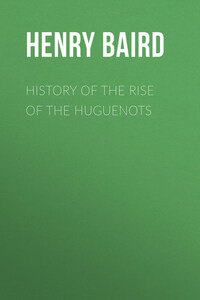CHAPTER XIII.
THE FIRST CIVIL WAR
Inconsistencies of the Edict of January.
The Edict of January was on its very face a compromise, and as such rested on no firm foundation. Inconsistent with itself, it fully satisfied neither Huguenot nor Roman Catholic. The latter objected to the toleration which the edict extended; the former demanded the unrestricted freedom of worship which it denied. If the existence of two diverse religions was compatible with the welfare of the state, why ignominiously thrust the places of Protestant worship from the cities into the suburbs? If the two were irreconcilable, why suffer the Huguenots to assemble outside the walls?
Huguenot leaders urge the observance of the edict.
Yet there was this difference between the attitude assumed by the rival parties with reference to the edict: while the Roman Catholic leaders made no secret of their intention to insist upon its repeal,1 the Huguenot leaders were urgent in their advice to the churches to conform strictly to its provisions, restraining the indiscreet zeal of their more impetuous members and exhibiting due gratitude to Heaven for the amelioration of their lot. To the people it was, indeed, a bitter disappointment to be compelled to give up the church edifices, and to resort for public service to the outskirts of the town. Less keen was the regret experienced by others not less sincerely interested in the progress of the purer doctrines, who, on account of their appreciation of the violence of the opposition to be encountered, had not been so sanguine in their expectations. And so Beza and other prominent men of the Protestant Church, after obtaining from Chancellor L'Hospital some further explanations on doubtful points, addressed to their brethren in all parts of France a letter full of wholesome advice. "God," said they, "has deigned to employ new means of protecting His church in this kingdom, by placing those who profess the Gospel under the safeguard of the king, our natural prince, and of the magistrates and governors established by him. This should move us so much the more to praise the infinite goodness of our Heavenly Father, who has at length answered the cry of His children, and lovingly to obey the king, in order that he may be induced to aid our just cause." The provisional edict, they added, was not all that might yet be hoped for. As respected the surrender of the churches, those Huguenots who had seized them on their own individual authority ought rather to acknowledge their former indiscretion than deplore the necessity for restitution. In fine, annoyance at the loss of a few privileges ought to be forgotten in gratitude for the gain of many signal advantages.2 The letter produced a deep impression, and its salutary advice was followed scrupulously, if not cheerfully, even in southern France, where the Huguenots, in some places, outnumbered the adherents of the Romish Church.
The papal party was less ready to acquiesce. The Edict of January was, according to its representative writers, the most pernicious law for the kingdom that could have been devised. By forbidding the magistrates from interfering with the Protestant conventicles held in the suburbs, by permitting the royal officers to attend, by conferring upon the ministers full liberty of officiating, a formal approval was, for the first time, given to the new sect under the authority of the royal seal.3 The pulpits resounded with denunciations of the government. The King of Navarre and the queen mother were assailed under scriptural names, as favoring the false prophets of Baal. Scarcely a sermon was preached in which they did not figure as Ahab and Jezebel.4 A single specimen of the spirited discourses in vogue will suffice. A Franciscan monk – one Barrier – the same from whose last Easter sermon an extract has already been given5 – after reading the royal ordinance in his church of Sainte-Croix, in Provins, remarked: "Well now, gentlemen of Provins, what must I, and the other preachers of France, do? Must we obey this order? What shall we tell you? What shall we preach? 'The Gospel,' Sir Huguenot will say. And pray, stating that the errors of Calvin, of Martin Luther, of Beza, Malot, Peter Martyr, and other preachers, with their erroneous doctrine, condemned by the Church a thousand years ago, and since then by the holy œcumenical councils, are worthless and damnable – is not this preaching the Gospel? Bidding you beware of their teaching, bidding you refuse to listen to them, or read their books; telling you that they only seek to stir up sedition, murder, and robbery, as they have begun to do in Paris and numberless places in the realm – is not this preaching 'the Gospel?' But some one may say: 'Pray, friar, what are you saying? You are not obeying the king's edict; you are still talking of Calvin and his companions; you call them and those who hold their sentiments








